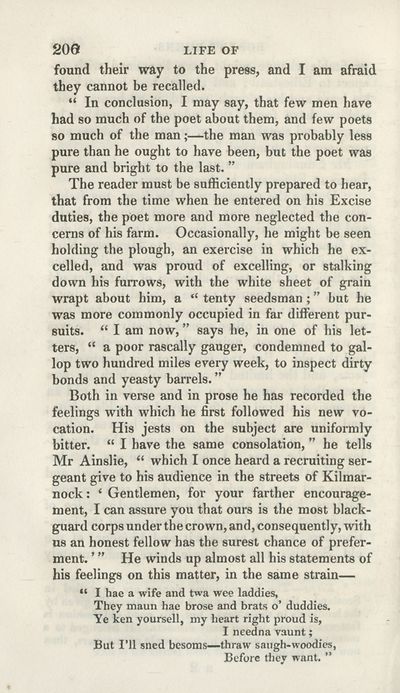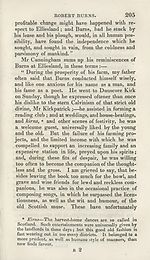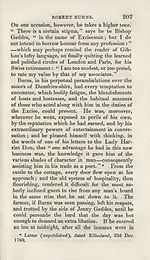Scotland/Scots > Life of Robert Burns
(216)
Download files
Complete book:
Individual page:
Thumbnail gallery: Grid view | List view

200 LIFE OF
found their way to the press, and I am afraid
they cannot be recalled.
“ In conclusion, I may say, that few men have
had so much of the poet about them, and few poets
so much of the man;—the man was probably less
pure than he ought to have been, but the poet was
pure and bright to the last. ”
The reader must be sufficiently prepared to hear,
that from the time when he entered on his Excise
duties, the poet more and more neglected the con¬
cerns of his farm. Occasionally, he might be seen
holding the plough, an exercise in which he ex¬
celled, and was proud of excelling, or stalking
down his furrows, with the white sheet of grain
wrapt about him, a “ tenty seedsman ; ” but he
was more commonly occupied in far different pur¬
suits. “ I am now, ” says he, in one of his let¬
ters, “ a poor rascally gauger, condemned to gal¬
lop two hundred miles every week, to inspect dirty
bonds and yeasty barrels.”
Both in verse and in prose he has recorded the
feelings with which he first followed his new vo¬
cation. His jests on the subject are uniformly
bitter. “ I have the same consolation, ” he tells
Mr Ainslie, “ which I once heard a recruiting ser¬
geant give to his audience in the streets of Kilmar¬
nock : ‘ Gentlemen, for your farther encourage¬
ment, I can assure you that ours is the most black¬
guard corps under the crown, and, consequently, with
us an honest fellow has the surest chance of prefer¬
ment. ’ ” He winds up almost all his statements of
his feelings on this matter, in the same strain—
“ I hae a wife and twa wee laddies.
They maun hae brose and brats o’ duddies.
Ye ken yoursell, my heart right proud is,
I needna vaunt;
But I’ll sued besoms—thraw saugh-woodies,
Before they want. ”
found their way to the press, and I am afraid
they cannot be recalled.
“ In conclusion, I may say, that few men have
had so much of the poet about them, and few poets
so much of the man;—the man was probably less
pure than he ought to have been, but the poet was
pure and bright to the last. ”
The reader must be sufficiently prepared to hear,
that from the time when he entered on his Excise
duties, the poet more and more neglected the con¬
cerns of his farm. Occasionally, he might be seen
holding the plough, an exercise in which he ex¬
celled, and was proud of excelling, or stalking
down his furrows, with the white sheet of grain
wrapt about him, a “ tenty seedsman ; ” but he
was more commonly occupied in far different pur¬
suits. “ I am now, ” says he, in one of his let¬
ters, “ a poor rascally gauger, condemned to gal¬
lop two hundred miles every week, to inspect dirty
bonds and yeasty barrels.”
Both in verse and in prose he has recorded the
feelings with which he first followed his new vo¬
cation. His jests on the subject are uniformly
bitter. “ I have the same consolation, ” he tells
Mr Ainslie, “ which I once heard a recruiting ser¬
geant give to his audience in the streets of Kilmar¬
nock : ‘ Gentlemen, for your farther encourage¬
ment, I can assure you that ours is the most black¬
guard corps under the crown, and, consequently, with
us an honest fellow has the surest chance of prefer¬
ment. ’ ” He winds up almost all his statements of
his feelings on this matter, in the same strain—
“ I hae a wife and twa wee laddies.
They maun hae brose and brats o’ duddies.
Ye ken yoursell, my heart right proud is,
I needna vaunt;
But I’ll sued besoms—thraw saugh-woodies,
Before they want. ”
Set display mode to:
![]() Universal Viewer |
Universal Viewer | ![]() Mirador |
Large image | Transcription
Mirador |
Large image | Transcription
| Antiquarian books of Scotland > Scotland/Scots > Life of Robert Burns > (216) |
|---|
| Permanent URL | https://digital.nls.uk/108248451 |
|---|
| Description | Thousands of printed books from the Antiquarian Books of Scotland collection which dates from 1641 to the 1980s. The collection consists of 14,800 books which were published in Scotland or have a Scottish connection, e.g. through the author, printer or owner. Subjects covered include sport, education, diseases, adventure, occupations, Jacobites, politics and religion. Among the 29 languages represented are English, Gaelic, Italian, French, Russian and Swedish. |
|---|

